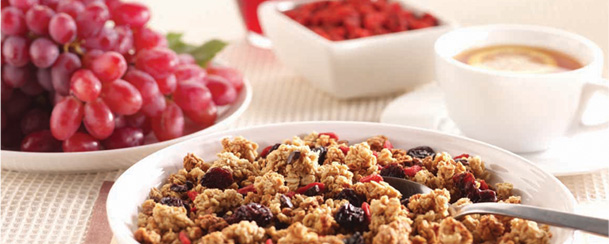Bowel Cancer
Bowel cancer is one of the most common types of cancer in the western world. The onset of bowel cancer normally begins with precancerous growths called polyps that may become cancerous over time. People with a family history of polyposis (in which multiple polyps develop) or those suffering from inflammatory bowel diseases may be at increased risk of developing bowel cancer.
There is much research to indicate that diet and lifestyle may have a significant impact on reducing the risk of developing bowel cancer.
Factors that may increase the risk of developing colon cancer are:
- Diets high in fried or dark browned meat as carcinogenic chemicals might form when meat is cooked (or over cooked) at high temperatures. (1)
- Low fibre diets (1,2)
- Excessive alcohol consumption (1)
- Diets high in sugar (2)
Factors that may reduce the risk of developing colon cancer are:
- High fibre diets – including whole grains, fruit and vegetables (1,2).
- Diets high in omega 3 fatty acids lead to a reduced risk of colon cancer (3) – omega 3 fats are found in oily fish, hemp seeds, flax seeds, walnuts, pumpkin seeds and avocadoes.
- Eating lots of cruciferous vegetables such as broccoli, brussel sprouts and kale – these contain anti-cancer chemicals as well as folic acid which protects against the development of cancer cells. (1,4)
- Get outside every day as vitamin D is thought to reduce the risk of developing colon cancer (1)
For more information on Bowel Cancer, visit www.beatingbowelcancer.org Always consult with your GP or medical doctor.
References
1. Ryap-Harshman M, Aldoori W. Diet and colorectal cancer: Review of the evidence. Can Fam Physician. 2007 Nov;53(11):1913-20
2. Key TJ, Spencer EA. Carbohydrates and cancer:an overview of the epidemiological evidence. Eur J Clin Nutr. 2007 Dec;61 Supp 1:S112-21h
3. Calviello G, Serini S, Piccioni E. n-3 polyunsaturated fatty acids and the prevention of colorectal cancer: molecular mechanisms involved. Curr Med Chem. 2007;14(29):3059-69
4. Arikawa AY, Gallaher DD, Cruciferous vegetables reduce morphological markers of colon cancer risk in dimethylhydrazine treated rats. J Nutr. 2008 Mar;138(3):526-32


